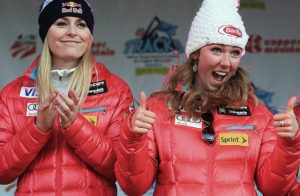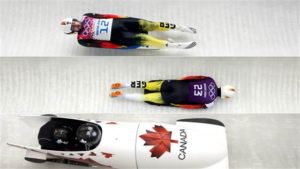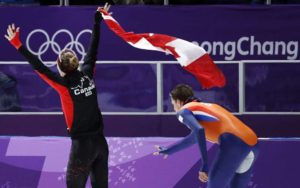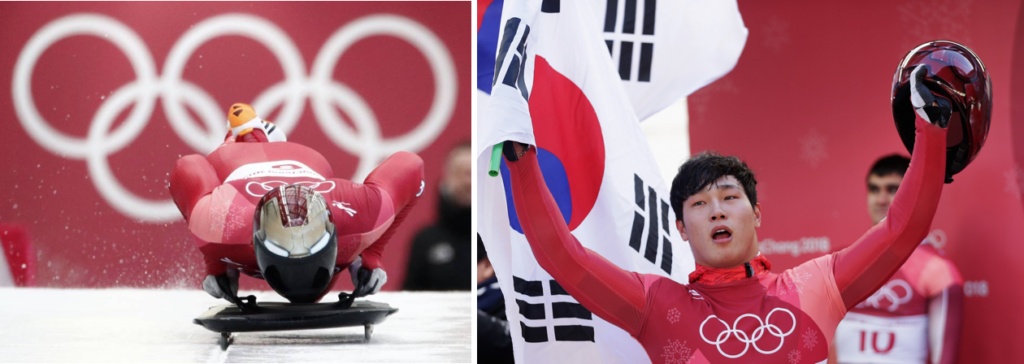Women’s Giant Slalom
Here is how I reveled in Mikaela Shiffrin’s humbling introduction to Olympic competition four years ago in “Sochi Olympics: Day 11,” February 18, 2014:
____________________
You probably know that Lindsey Vonn of the United States was being billed as the darling of these Games until a recurring injury prevented her from even participating. What you probably don’t know is that the jingoistic American media anointed first-time Olympian Mikaela Shiffrin of the United States as Vonn’s heir apparent. This, despite the participation of far more accomplished Alpine skiers like Maria Hoefl-Riesch of Germany, Anna Fenninger of Austria, and Tina Maze of Slovenia.
Well, Shiffrin made her big debut today and was properly left in the snow. …
Shiffrin has one more event, the Women’s Slalom, not only to live up to her billing as Vonn’s golden heir but also to salvage what little remains of Team USA’s reputation for having the best Alpine skiers in the world. For, of the 22 medals that have already been awarded in this sport, Team USA has won only 3—none of them gold.
____________________
But oh, what a difference four years make.
- Mikaela Shiffrin of the United States won gold; Ragnhild Mowinckle of Norway, silver; Federica Brignone of Italy, bronze.
Not only did she avenge this loss but media worldwide are hyping her as the darling of these Games in ways Vonn never experienced. In fact, only Eric Heiden can relate to the expectation of winning five golds in a single Winter Olympics.
 Except that, despite this golden start, Shiffrin’s mother/coach has already lowered expectations. Five days of weather delays mean that Shiffrin would have to compete for six or seven consecutive days to complete her feat. This, Shiffrin’s mother says, would be too much.
Except that, despite this golden start, Shiffrin’s mother/coach has already lowered expectations. Five days of weather delays mean that Shiffrin would have to compete for six or seven consecutive days to complete her feat. This, Shiffrin’s mother says, would be too much.
As it happened, she had less than 24 hours before she was competing again in the Women’s Slalom, her best event.
Women’s Slalom
Despite lowered expectations, Shiffrin could not live up to the hype. NBC commentators began telegraphing (and making excuses for) an upset after she finished the first of two runs well behind the leader. Shiffrin then tipped her own hand when she made quite a show of “puking buckets” before her second run, which she would later blame not on competitive nerves but on some obscure virus (slalomcitus upsetus?).
Still, everybody seemed shocked when, far from winning what seemed a guaranteed gold, she did not even win bronze.
- Frida Hansdotter of Sweden won gold; Wendy Holdener of Switzerland, silver; and Katharina Gallhuber of Austria, bronze.
 Shiffrin finished fourth, matching the Olympian disappointment Shaun White must have felt (and caused) in Sochi when he too finished fourth in his guaranteed-gold, best event, the Men’s Halfpipe (see Day 5). To be fair, unlike White, Shiffrin is no one-gold wonder. After all, she has already won one gold at these Games, and still has two opportunities to win more.
Shiffrin finished fourth, matching the Olympian disappointment Shaun White must have felt (and caused) in Sochi when he too finished fourth in his guaranteed-gold, best event, the Men’s Halfpipe (see Day 5). To be fair, unlike White, Shiffrin is no one-gold wonder. After all, she has already won one gold at these Games, and still has two opportunities to win more.
That said, there must be some second-guessing her mother’s decision to withdraw from today’s Super-G. But I suspect avoiding head-to-head competition with Lindsey Vonn, the dowager ice queen of these Games, had a lot to do with that decision. Vonn will be making her long-delayed debut.
Men’s Downhill
This is easily the premier event at the Winter Olympics, much as the Men’s 100m is at the Summer Olympics. … Aksel Lund Svindal of Norway was my favorite to win. … He made a lasting impression when I saw a documentary years ago on the dedication and effort he put into his rehabilitation. …
Alas, it was not to be … Svindal finished fourth, just off the podium.
(“Sochi Olympics: Day 2,” The iPINIONS Journal, February 9, 2014)
Svindal (35) was the oldest man in this field – a fact commentators apparently felt they needed to share repeatedly. But I take middle-age pride in watching older athletes triumph over younger ones – as Shaun White (31) of the United States did on Day 5 when he bested upstart Auymu Hirano (19) of Japan to win gold in the Men’s Halfpipe.
This is why I couldn’t have been happier with the results in this event.
- Aksel Lund Svindal of Norway won gold; Kjetil Jansrud of Norway, silver; and Beat Feuz of Switzerland, bronze.
That said, realizing that I am old enough to be Svindal’s father must be one of those signposts of growing old. Granted, he would have made me a very young baby daddy.
Skeleton/Luge vs. Bobsled
Am I the only one who wonders why bobsledding is even worthy of Olympic competition?
 Skeleton/Luge involves athletes sledding down the ice track, at speeds nearing 80mph, not sitting snugly in soapbox-like sleds called Bobsleds, but lying facedown, head-first or flat on their backs, feet-first – completely exposed on snowboard-like sleds. Which makes it fair to assert that Skeleton/Luge is to Bobsled what the NFL is to Touch Football, no?
Skeleton/Luge involves athletes sledding down the ice track, at speeds nearing 80mph, not sitting snugly in soapbox-like sleds called Bobsleds, but lying facedown, head-first or flat on their backs, feet-first – completely exposed on snowboard-like sleds. Which makes it fair to assert that Skeleton/Luge is to Bobsled what the NFL is to Touch Football, no?
Georgian luger Nodar David Kumaritashvili brought the danger involved into tragic relief during a practice run on the morning of Opening Ceremony for the 2010 Vancouver Olympics. He suffered a fatal crash, which effectively turned that ceremony into a wake. But it’s this obvious danger that makes Skeleton/Luge so much more thrilling to watch than Bobsled.
Which makes it fair to question why Bobsled is getting so much more media attention, no? Oh, right – slapdash teams still trying to soak up attention and rake in dough like Jamaica’s “Cool Runnings” team from the 1988 Calgary Olympics. But I digress …
In fact, the only reason I’m commenting on these sports is to hail host country South Korea for wining its second gold in Men’s Skeleton.
- Yun Sungbin of South Korea won gold; Kikita Tregubov of Russia, silver; Dom Parsons of Great Britain, bronze.
Sungbin made history by becoming the first Asian to win gold in this event.
Men’s 10,000m Speedskating
I am commenting on this event only to memorialize Sven Kramer’s disappointing performance.
To put what happened into context, imagine that, instead of winning gold in the 100m at the 2008 Beijing Olympics and 2012 London Olympics, Usain Bolt got disqualified and won silver, respectively. Now imagine his all-consuming desire for redemption at the 2016 Rio Olympics. More to the point, imagine the interest worldwide, to say nothing of it in Jamaica, in watching Bolt achieve it.
Indeed, the interest back home in the Netherlands was such that teachers reportedly suspended classes so students could join the rest of the nation in watching him. That’s what Kramer had riding on this event.
 But on Day 2 – in commenting on his three-peat victory in the 5000m – I wrote that “I fear disappointment awaits again” in the 10, 000m. Sure enough, Kramer looked a winded shell of himself as the effectively waddled across the finish line … in sixth place.
But on Day 2 – in commenting on his three-peat victory in the 5000m – I wrote that “I fear disappointment awaits again” in the 10, 000m. Sure enough, Kramer looked a winded shell of himself as the effectively waddled across the finish line … in sixth place.
- Ted-Jan Bloemen of Canada won gold; Jorrit Bergsma of the Netherlands, silver; Nicola Tumolero of Italy, bronze.
Incidentally, my sense is that Dutchmen were as shocked and saddened watching Kramer get so soundly beaten as Jamaicans were watching Bolt pull up lame in his final event at the World Championships in London last year.
MEDAL COUNT: Norway 17; Germany 15; Canada 13
Related commentaries:
Day 1-5…
Sochi Day 11…
Sochi Day 2…
Bolt pulls up lame…


